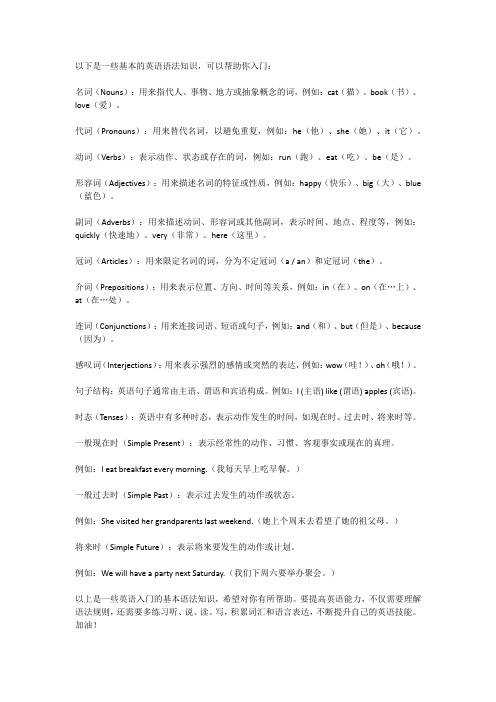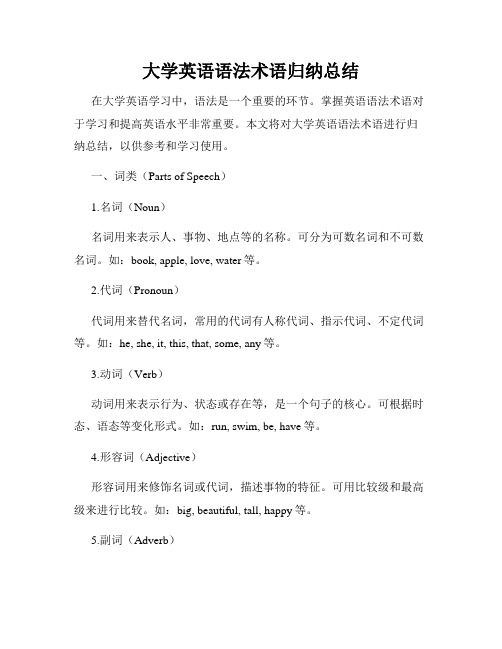大学英语语法之名词 Nouns
大学英语语法总结(全面)

大学英语语法总结(全面)大学英语语法总结(全面完整版)1. 介词(Prepositions)- 表示地点:at, in, on- 表示时间:at, in, on- 表示方式:by, with- 表示原因:because of, due to- 表示目的:for, to2. 冠词(Articles)- 定冠词:the- 不定冠词:a, an3. 代词(Pronouns)- 主格代词:I, you, he, she, it, we, they- 宾格代词:me, you, him, her, it, us, them- 所有格代词:my, your, his, her, its, our, their- 反身代词:myself, yourself, himself, herself, itself, ourselves, themselves4. 名词(Nouns)- 单数名词:book, chair, dog- 复数名词:books, chairs, dogs- 不可数名词:water, money, information5. 动词(Verbs)- 一般现在时:I walk, you walk, he/she/it walks, we walk, they walk- 一般过去时:I walked, you walked, he/she/it walked, we walked, they walked- 现在进行时:I am walking, you are walking, he/she/it is walking, we are walking, they are walking- 过去进行时:I was walking, you were walking, he/she/it was walking, we were walking, they were walking- 一般将来时:I will walk, you will walk, he/she/it will walk, we will walk, they will walk6. 形容词(Adjectives)- 描述名词特征:big, small, tall- 比较级:bigger, smaller, taller- 最高级:biggest, smallest, tallest7. 副词(Adverbs)- 表示方式:quickly, slowly- 表示程度:very, extremely- 表示时间:now, yesterday8. 连词(Conjunctions)- 表并列:and, or- 表递进:furthermore, moreover- 表转折:however, but- 表原因:because, since以上是大学英语语法的简要总结,希望对你有帮助。
英语入门语法知识

以下是一些基本的英语语法知识,可以帮助你入门:名词(Nouns):用来指代人、事物、地方或抽象概念的词,例如:cat(猫)、book(书)、love(爱)。
代词(Pronouns):用来替代名词,以避免重复,例如:he(他)、she(她)、it(它)。
动词(Verbs):表示动作、状态或存在的词,例如:run(跑)、eat(吃)、be(是)。
形容词(Adjectives):用来描述名词的特征或性质,例如:happy(快乐)、big(大)、blue (蓝色)。
副词(Adverbs):用来描述动词、形容词或其他副词,表示时间、地点、程度等,例如:quickly(快速地)、very(非常)、here(这里)。
冠词(Articles):用来限定名词的词,分为不定冠词(a / an)和定冠词(the)。
介词(Prepositions):用来表示位置、方向、时间等关系,例如:in(在)、on(在…上)、at(在…处)。
连词(Conjunctions):用来连接词语、短语或句子,例如:and(和)、but(但是)、because (因为)。
感叹词(Interjections):用来表示强烈的感情或突然的表达,例如:wow(哇!)、oh(哦!)。
句子结构:英语句子通常由主语、谓语和宾语构成。
例如:I (主语) like (谓语) apples (宾语)。
时态(Tenses):英语中有多种时态,表示动作发生的时间,如现在时、过去时、将来时等。
一般现在时(Simple Present):表示经常性的动作、习惯、客观事实或现在的真理。
例如:I eat breakfast every morning.(我每天早上吃早餐。
)一般过去时(Simple Past):表示过去发生的动作或状态。
例如:She visited her grandparents last weekend.(她上个周末去看望了她的祖父母。
)将来时(Simple Future):表示将来要发生的动作或计划。
大学英语语法术语归纳总结

大学英语语法术语归纳总结在大学英语学习中,语法是一个重要的环节。
掌握英语语法术语对于学习和提高英语水平非常重要。
本文将对大学英语语法术语进行归纳总结,以供参考和学习使用。
一、词类(Parts of Speech)1.名词(Noun)名词用来表示人、事物、地点等的名称。
可分为可数名词和不可数名词。
如:book, apple, love, water等。
2.代词(Pronoun)代词用来替代名词,常用的代词有人称代词、指示代词、不定代词等。
如:he, she, it, this, that, some, any等。
3.动词(Verb)动词用来表示行为、状态或存在等,是一个句子的核心。
可根据时态、语态等变化形式。
如:run, swim, be, have等。
4.形容词(Adjective)形容词用来修饰名词或代词,描述事物的特征。
可用比较级和最高级来进行比较。
如:big, beautiful, tall, happy等。
5.副词(Adverb)副词用来修饰动词、形容词、其他副词等,用于描述行为方式、程度、时间等。
如:quickly, very, soon, often等。
6.介词(Preposition)介词用来表达位置、方向、时间、原因等关系,常与名词或代词搭配使用。
如:in, on, at, for, with等。
7.连词(Conjunction)连词用来连接词语、短语、从句等,使句子结构更加完整。
如:and, but, or, because等。
8.感叹词(Interjection)感叹词用来表达强烈的情感或意见,常用于口语交流中。
如:oh, wow, yes, no等。
二、句子成分(Sentence Elements)1.主语(Subject)主语是一个句子中的核心,通常是一个名词或代词。
如:I, he, the dog, my sister等。
2.谓语(Predicate)谓语是一个句子中的动词或动词短语,用来描述主语的动作或状态。
【绝对精品】英语语法4-名词-Nouns

Partitives denoting pairs, groups, flocks, etc.
Part 4
Genitive Nouns
Content 2
1
Genitive Noun VS
of- Phrase
Independent Genitive VS
Double Genitive
Genitive Noun
to have too much winter = a too long period of cold weather
man, coward, coquette, politician, sportsman, sportsman, scholar, poet, etc.
to be fool enough = to be foolish enough
parties, ladies, spies
4 元音加y结尾,加-s: boys, plays
5 元音(字母)加o结尾,加-s: radios, zoos 6 辅音加o结尾,加-es: potatoes, heroes 7 专有名词/缩略词,加-s: Romeos, photos, kilos 8 少数以-f, -fe结尾,变-f. -fe为-v再加-es:
1 2 3 45 6
the girls’ dormiMtorayr;y’s and Bob’s books;Dickens’s; a teachers’ colleMgeary and Bob’s books Jones’s;
Marx’s; Ross’s
GPen44itive Noun
1 Possessive genitive
Part 2
Number Forms of Nouns
英语语法知识点

英语语法词性一、实词1.名词(nouns)n.:名词是词性的一种,也是实词的一种,是指代人、物、事、时、地、情感、概念等实体或抽象事物的词。
名词可以独立成句。
在短语或句子中通常可以用代词来替代。
名词可以分为专有名词(Proper Nouns)和普通名词(Common Nouns),专有名词是某个(些)人,地方,机构等专有的名称,如Beijing,China等。
普通名词是一类人或东西或是一个抽象概念的名词,如:book,sadness等。
2.代词(pronoun)pron.:代词是代替名词的一种词类。
大多数代词具有名词和形容词的功能。
英语中的代词,按其意义、特征及在句中的作用分为:人称代词、物主代词、指示代词、反身代词、相互代词、疑问代词、关系代词、连接代词和不定代词九种。
3.数词(numeral)Num.:表示“多少”和“第几”的词,叫数词。
其用法相当于名词或者形容词。
数词分为基数词和序数词两种。
4.形容词(adjective)adj.或a.;很多语言中均有的主要词类中的一种。
主要用来修饰名词的词,表示事物的特征。
形容词用来修饰名词或代词,表示人或事物的性质、状态,和特征的程度好坏,与否。
5.副词(adverb)adv.:是一种用来修饰动词、形容词、全句的词,说明时间、地点、程度、方式等概念的词。
副词是一种半虚半实的词。
副词可分为:时间副词、地点副词、方式副词、程度副词、疑问副词、连接副词、关系副词、频率副词和说明性副词等。
6.动词(V erb)v.:动词,就是用来形容或表示各类动作的词汇。
基本上每个完整的句子都有一个动词,要表示第二个动作时可使用不定词、动名词、对等连接词、从属连接词或增加子句等方法连结。
二、虚词7.冠词(article) art.:冠词是虚词,本身不能单独使用,也没有词义,它用在名词的前面,帮助指明名词的含义。
冠词可以说是名词的一种标志,它不能离开名词而独立存在。
表示的主语数量或者特征。
第一章名词 英语语法

Unit 1 Nouns一.名词的分类◆注意:1. 有少数名词属兼类名词,作不可数名词表示抽象概念或物质,作C.n.时表示具体事物。
beauty美--- a beauty 美人will 意志--- a will 遗嘱room --- a room exercise锻炼--- an exercise练习word消息--- a word character性格--- a character人物iron--- an iron 电熨斗success--- an success wonder惊奇---a wonder 奇观duck---a duck2. 有些名词有单数和复数形式,但意思不同。
brain---brains 智能custom---customs good---goods difficulty---difficulties game --- games运动会green --- greens manner方式--- manners礼貌work --- works people --- peoples time --- times时代,次数wood--- woods树林damage---damages 赔偿费import--- imports进口货物necessity--- necessities必需品3. 有些抽象名词可在前面加a或an,转化为个体名词。
如:a business 一家公司 a pity 令人惋惜的事 a pleasure一件乐事 a knowledge 一门知识 a voice 一种声音 a walk 一次步行a rest 一次休息 a help 一个帮手 a surprise 一次惊奇 a failure 一次失败 a smile 微笑an interest兴趣an honor荣誉二.名词的数⑴名词复数规则变化◆注意:1. 合成词的第一个词是n.或者主体词是时,一般把第一个名词变成复数。
大学英语语法(词性与句法)
第一部分词性及其句法功能词性是英语中的单词根据词义、句法作用和形式特征所作的分类。
共有十类:名词、动词、形容词、代词、数词、冠词、副词、介词、连词、感叹词。
词类英语名称(简称)意义例词1. 名词Nouns ( n. )表示人、事物、时间、地点或抽象概念的名称John,room2.动词Verbs ( v. ) vt 及物vi 不及物表示动作、状态或性质stand ,be3.形容词Adjectives ( adj. ) 表示人或事物的属性或特征good,interesting4.代词Pronouns ( pron. ) 代替名词、数词以避免重复them,everything5.数词Numerals ( num. ) 表示数量或顺序nine,first6.冠词Articles ( art. ) 用于名词之前,帮助说明名词的含义a,an,the7.副词Adverbs ( adv. )修饰动词、形容词、其它副词或全句,表示行为特征或性状特征almost ,bravely8.介词Prepositions ( prep. )用于名词或代词之前,表示名词、代词与其它词之间的关系near,from9.连词Conjunction ( conj. ) 连接单词、短语、从句或句子and ,but10. 感叹词Interjection( interj. ) 表示说话时的语气或感情hello ,oh在上述的十大词类中,名词、代词、形容词、副词、数词、动词等具有明确的意义,可以在句中独立充当句子成分,称为实义词。
介词、连词和冠词只能起联系或辅助的作用,都不在句子中担任任何成分,称为虚词。
感叹词一般不构成句子的一部分,通常作独立成分。
一. 名词Nouns ( n. )1.名词的句法功能The man, a success of car industry , was elected deputy to the People's Congress last year and this morning a newspape r called him an economic criminal,which was really a shock to us all.名词在句子中主要作主语(Subject)、宾语(Object)、表语(Predicative )、主补(Subject Complement )、宾补(Object Complement )和同位语(Appositive),还可以作定语(Attribute) 、状语(Adverbial)和呼语(V ocative)。
名词、冠词
一、语法之名词详解1. 名词名词可以分为专有名词(Proper Nouns)和普通名词(Common Nouns),专有名词是某个(些)人,地方,机构等专有的名称,如Beijing,China等。
普通名词是一类人或东西或是一个抽象概念的名词,如:book,sadness等。
普通名词又可分为下面四类:1)个体名词(Individual Nouns):表示某类人或东西中的个体,如:gun。
2)集体名词(Collective Nouns):表示若干个个体组成的集合体,如:family。
3)物质名词(Material Nouns):表示无法分为个体的实物,如:air。
4)抽象名词(Abstract Nouns):表示动作、状态、品质、感情等抽象概念,如:work。
个体名词和集体名词可以用数目来计算,称为可数名词(Countable Nouns),物质名词和抽象名词一般无法用数目计算,称为不可数名词(Uncountable Nouns)。
归纳一下,名词的分类可以下图表示:1.1 名词复数的规则变化___________________________________________________情况构成方法读音例词__________________________________________________一般情况加-s 1.清辅音后读/s/;map-maps2.浊辅音和元音后bag-bags读/z/;car-cars___________________________________________________以s,sh,ch,x等结尾的词加-es读/iz/bus-buseswatch-watches_______________________________________________________以ce,se,ze,(d)ge等结尾的词加-s读/iz/license-licenses_________________________________________________________以辅音字母+y变y 为i结尾的词再加es读/z/baby---babies_________________________________________________________1.2 其它名词复数的规则变化1) 以y结尾的专有名词,或元音字母+y 结尾的名词变复数时,直接加s变复数:如:two Marys the Henrysmonkey---monkeys holiday---holidays比较:层楼:storey ---storeys story---stories2) 以o 结尾的名词,变复数时:a. 加s,如:photo---photos piano---pianosradio---radios zoo---zoos;b. 加es,如:potato--potatoes tomato--tomatoesc. 均可,如:zero---zeros / zeroes3) 以f或fe 结尾的名词变复数时:a. 加s,如:belief---beliefs roof---roofssafe---safes gulf---gulfs;b. 去f,fe 加ves,如:half---halvesknife---knives leaf---leaves wolf---wolveswife---wives life---lives thief---thieves;c. 均可,如:handkerchief:handkerchiefs / handkerchieves1.4 不可数名词量的表示1)物质名词a. 当物质名词转化为个体名词时。
英语语法复习-名词
Some nouns have a regular plural form that does not follow the 's' rule. For example, 'child' becomes 'children'.
English Grammar Review Nouns
目录
• Types of Nouns • The number of nouns • The case of a noun • The nature of nouns • The role of nouns in sentences
01 Types of Nouns
Neutral nouns can be used to refer to individuals or objects of any gender or type. For example, "A child needs love and attention" can be used to refer to a
possessive case because it shows possession of the car by John.
Dative case
Dative case is used when the noun is the indirect object of a verb or preposition.
英语语法名词解释
英语语法名词解释Noun (名词)A noun is a word that is used to name a person, place, thing, quality, or action. It is one of the eight parts of speech in English grammar. Nouns can be singular or plural, and they can also be countable or uncountable.There are several types of nouns:1. Proper nouns: These nouns refer to specific people, places, or things and begin with a capital letter. Examples include names of individuals (e.g. John, Mary), names of countries (e.g. China, United States), and names of cities (e.g. London, New York).2. Common nouns: These nouns refer to general people, places, or things. They are not capitalized unless they appear at the beginning of a sentence. Examples include words like dog, book, and city.3. Concrete nouns: These nouns refer to things that can be perceived through the five senses. Examples include words like table, chair, and apple.4. Abstract nouns: These nouns refer to ideas, concepts, or qualities that cannot be perceived through the senses. Examples include words like love, happiness, and honesty.5. Collective nouns: These nouns refer to a group of people, animals, or things. Examples include words like team, family, and herd.6. Compound nouns: These nouns are made up of two or more words that together form a single noun. Examples include words like swimming pool, coffee table, and high school.Nouns in English can also be categorized as countable or uncountable:1. Countable nouns: These nouns refer to things that can be counted and have a singular and plural form. Examples include words like book (singular) and books (plural).2. Uncountable nouns: These nouns refer to things that cannot be counted and do not have a plural form. Examples include words like water, air, and happiness.In addition, nouns can also function as subjects, objects, or possessives in a sentence. They can be modified by articles (a, an, the) or other determiners (my, your, his, her).Overall, nouns play a crucial role in English grammar as they help to provide clarity and specificity in communication by naming people, places, things, qualities, and actions.。
- 1、下载文档前请自行甄别文档内容的完整性,平台不提供额外的编辑、内容补充、找答案等附加服务。
- 2、"仅部分预览"的文档,不可在线预览部分如存在完整性等问题,可反馈申请退款(可完整预览的文档不适用该条件!)。
- 3、如文档侵犯您的权益,请联系客服反馈,我们会尽快为您处理(人工客服工作时间:9:00-18:30)。
a poem a machine a garment a job a laugh a permit
poetry machinery clothing work laughter permission
features
性 (gender) 数 (number) 格 (case)
gender
阳性--masculine 阴性—feminine 中性—neuter
2 um →a agendum → agenda datum → data stadium → stadia /stadiums stratum → strata gymnasium → gymnasia / bacterium → bacteria sanatorium → sanatoria /
Usage
1 subject 3 object 5 adverbial 2 predicative 4 attribute 6 complement
7 appositive 8 vocative
3 principles:
~ of grammatical concord
语法一致原则
~ of notional concord
boyfriend; girlfriend; woman doctor; man writer; ﹡he-goat; she-wolf; ﹡male elephant; female monkey;
﹡
number
单数—singular number 单数形式—singular form 复数—plural number 复数形式—plural form
意义一致原则
~ of attraction
吸引原则
rules for sing. & plural
The volleyball team are playing well. The police are on the line of defense. This works was built in 1982. Is the United States a big country? All possible means have been adopted. Every means has been tried.
grown-up grown-ups go-between go-betweens drawback drawbacks
man-servant → men-servants woman-doctor → women-doctors *woman-hater → woman-haters *boy students girlfriends
custom; force; good; ground; iron; letter; sand; work;
customs; forces; goods; grounds; irons; letters; sands ; works;
case
普通格 - common case 所有格 - possessive case 主格 - nominative case 宾格 - objective case
We love our great motherland.
② indirect object Who sent Mr. Smith this letter?
③ prepositional object
The letter is for his mother.
①object complement
They call me Xiao Wang.
possessive case
formation application
singular nouns plural nouns proper nouns
加-’s
-s结尾加-’ 不以-s结尾加-’s
加-’s;以-s结尾加’/’s 最后名词后加-’s 每个名词后均加-’s
shared nouns
un-shared nouns
double possessive case
a friend of my husband’s the nice daughter of his sister’s that little brother of John’s those wonderful performances of the children’s
①
leave out nouns mentioned before -Whose book is it? -It’s Tom’s. My bike is newer than Tom’s. ② leave out nouns for house, shops, buildings, etc. I’m going to my sister’s tomorrow. He’s gone to the barber’s. St. Paul’s (Cathedral)
5 heroes, Negroes, potatoes, tomatoes, echoes, vetoes, dominoes, torpedoes ﹡bamboos; radios; studios; cuckoos; folios; zoos embryos; kangaroos; ﹡photos, solos, pianos, kilos, memos, tobaccos, Eskimos, Filipinos, hippos
﹡
banjo, cargo, motto, halo, volcano, buffalo, archipelago, manifesto, tornado
1 man, woman, foot, tooth, goose, mouse 2 child, ox 3 fish, sheep, deer, Chinese, means, series, species, swine, aircraft, corps
irregular
1 changing vowels 2 adding suffix 3 in the same form (1-3) 4 plural form of letter, number, symbol & word 5 plural form of abbreviations
1 sis → ses crisis → crises thesis → theses emphasis → emphases analysis → analyses basis → bases axis → axes
词义
可数性
based on meanings
proper
noun common noun individual noun collective noun material noun abstract noun
专有名词 普通名词 个体名词 集合名词 物质名词
抽象名词
based on countability
☆
industry’s problems; machine’s power; Cambridge’s students;
☆
China’s capital; earth’s surface; the city’s museum; the Yellow River’s length;
☆
five minutes’ walk; today’s newspaper; ten miles’ drive; a kilo’s weight; ten dollars’ price;
compound nouns
with principal body without principal body with man, woman & boy, girl
looker-on lookers-on passer-by passers-by runner-up runners-up son-in-law sons-in-law editor-in-chief editors-in-chief grandchild grandchildren army-man army-men
English Grammar
The Nouns
Classification Features Usage Agreement between S. and V. Practice
classification of nouns
based upon meanings based upon countabith nearest n.
②subject complement
He is called Uncle Li
nouns with vitality
my mother’s glasses man’s knowledge camel’s legs
nouns about: industry, material, machinery, factory, college and university, etc. nouns about: country, planet, city, oceans, rivers, etc nouns about: time, distance, price, weights and measures, etc.
3 us → i focus → foci / focuses nucleus → nuclei / nucleuses stratus → strati stimulus → stimuli 4 a → ae formula → formulae
5 on → a phenomenon → phenomena criterion → criteria / 6 ix/ex → ices appendix → appendices / index → indices /
